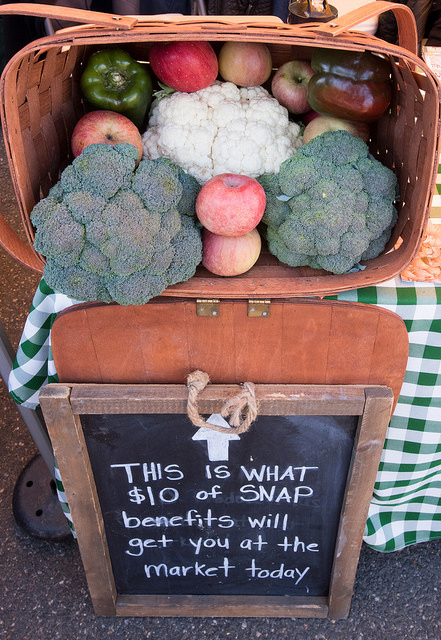Increasing Use of SNAP Time Limit Won’t Help Low-Income Marylanders Find Jobs
 Officials at the U.S. Department of Agriculture have proposed a new rule would cut off nutrition assistance to as many as 30,000 Marylanders who struggle to find steady work.
Officials at the U.S. Department of Agriculture have proposed a new rule would cut off nutrition assistance to as many as 30,000 Marylanders who struggle to find steady work.
People who are deemed to be “able-bodied adults without dependents” can be subject to harsh time limits for receiving support from the Supplemental Nutrition Assistance Program (SNAP). Those who are unable to find at least 20 hours of work per week are limited to receiving SNAP for only three months out of a three-year period, but the USDA currently allows counties and states with high unemployment rates to waive these rules and ensure that more people can continue to put food on the table while they get back on their feet.
Currently, 11 jurisdictions in Maryland with above-average unemployment rates are able to waive this harsh time limit. The USDA’s proposed rule change would prevent almost all of these jurisdictions, including Baltimore City and parts of Western Maryland and the Eastern Shore, from receiving waivers for the time limit.
The existing rules applying to adults without dependents are already unfair, cutting off food assistance to individuals who are in need just because they are unable to find a reliable 20-hour-a-week job. Individuals who are actively looking for a job but haven’t found one yet or who are working but not getting enough hours on a weekly basis can lose much-needed assistance due to the time limit, leaving them at risk of going hungry.
The jurisdictions that currently have waivers for the time limit have higher poverty rates than the rest of the state. On average, individuals who are protected by the waivers have an income that is just 33 percent of the poverty line. Many work in unstable jobs, and food assistance helps them get by while they are between jobs. In Worcester County the unemployment rate reached 11.2 percent in December 2018, while the statewide average was only 3.1 percent. Seasonal work in the region leaves low-income workers unemployed for months at a time each year.
Even as the national unemployment rate declines, unemployment rates for people of color and for adults who lack a high school diploma or GED remain significantly higher. Making SNAP work requirements harsher will not improve outcomes for low-income people, and taking food out of the mouths of poor unemployed or underemployed workers doesn’t empower them to find nonexistent jobs or secure more hours.
Our state’s current ability to exempt certain individuals from the rule is important, but is wholly insufficient and could never make up for having to apply the time limit in areas with elevated unemployment. And, underfunded workforce development systems, including SNAP Employment and Training programs, are not well-suited to meet the job training requirements under this rule. Put simply, there is no justification for weakening current waiver rules and exposing more vulnerable people to this SNAP eligibility cutoff.
The only action the Maryland Center on Economic Policy encourages the USDA to take with respect to this time limit rule is to propose its elimination. Restoring SNAP’s ability to provide food assistance to impoverished, unemployed people would be a powerful policy improvement that would reduce food insecurity among those seeking work.
We still have a chance to stop the change and keep the more reasonable rule in place. Anyone affected by the proposed change or wishing to stand with those in our communities the rule change would affect should submit a public comment opposing it. The comment deadline is fast approaching – the comment period ends April 2.
